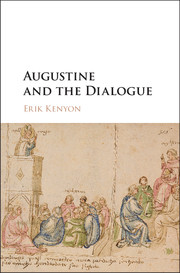Book contents
- Augustine and the Dialogue
- Augustine and the Dialogue
- Copyright page
- Dedication
- Contents
- Acknowledgments
- Abbreviations
- Introduction
- Chapter 1 The Pursuit of Wisdom
- Chapter 2 From Plato to Augustine
- Chapter 3 The Measure of Happiness
- Chapter 4 God’s Classroom
- Chapter 5 An Advanced Course
- Chapter 6 Philosophy and Kathartic Virtue
- Chapter 7 Piety, Pride and the Problem of Evil
- Conclusion
- Bibliography
- Index
Chapter 4 - God’s Classroom
De ordine and De Musica
Published online by Cambridge University Press: 16 February 2018
- Augustine and the Dialogue
- Augustine and the Dialogue
- Copyright page
- Dedication
- Contents
- Acknowledgments
- Abbreviations
- Introduction
- Chapter 1 The Pursuit of Wisdom
- Chapter 2 From Plato to Augustine
- Chapter 3 The Measure of Happiness
- Chapter 4 God’s Classroom
- Chapter 5 An Advanced Course
- Chapter 6 Philosophy and Kathartic Virtue
- Chapter 7 Piety, Pride and the Problem of Evil
- Conclusion
- Bibliography
- Index
Summary
- Type
- Chapter
- Information
- Augustine and the Dialogue , pp. 101 - 140Publisher: Cambridge University PressPrint publication year: 2018



